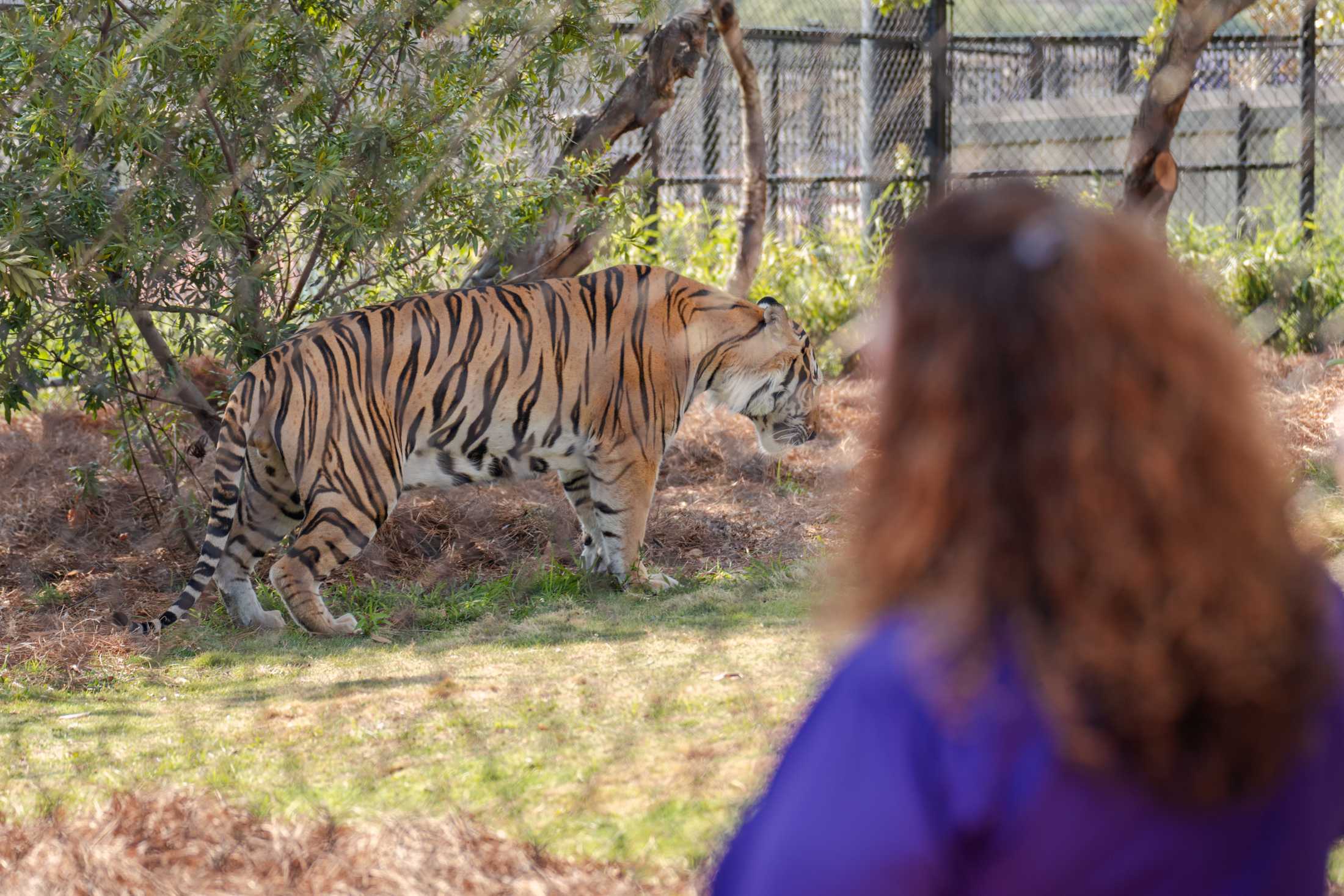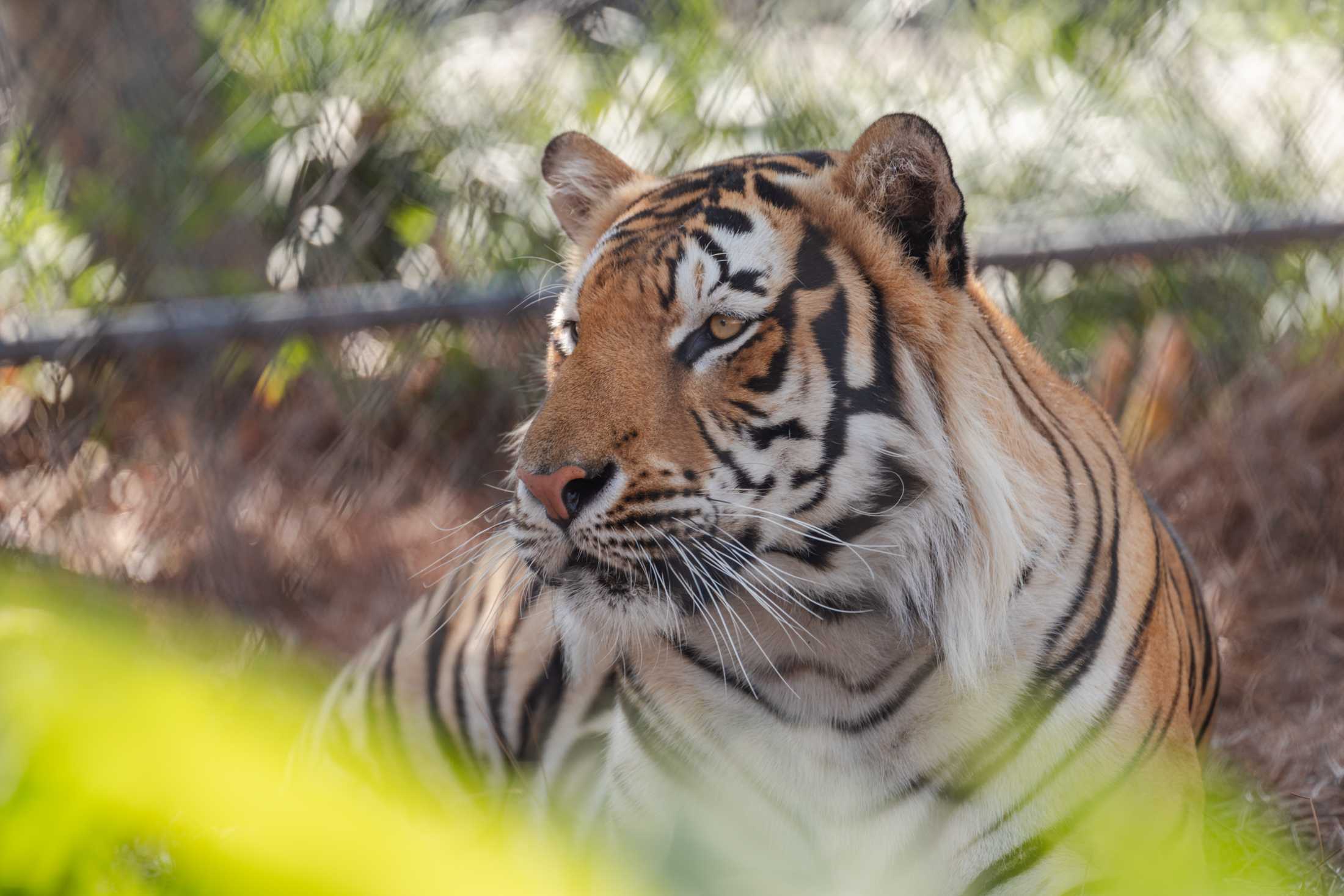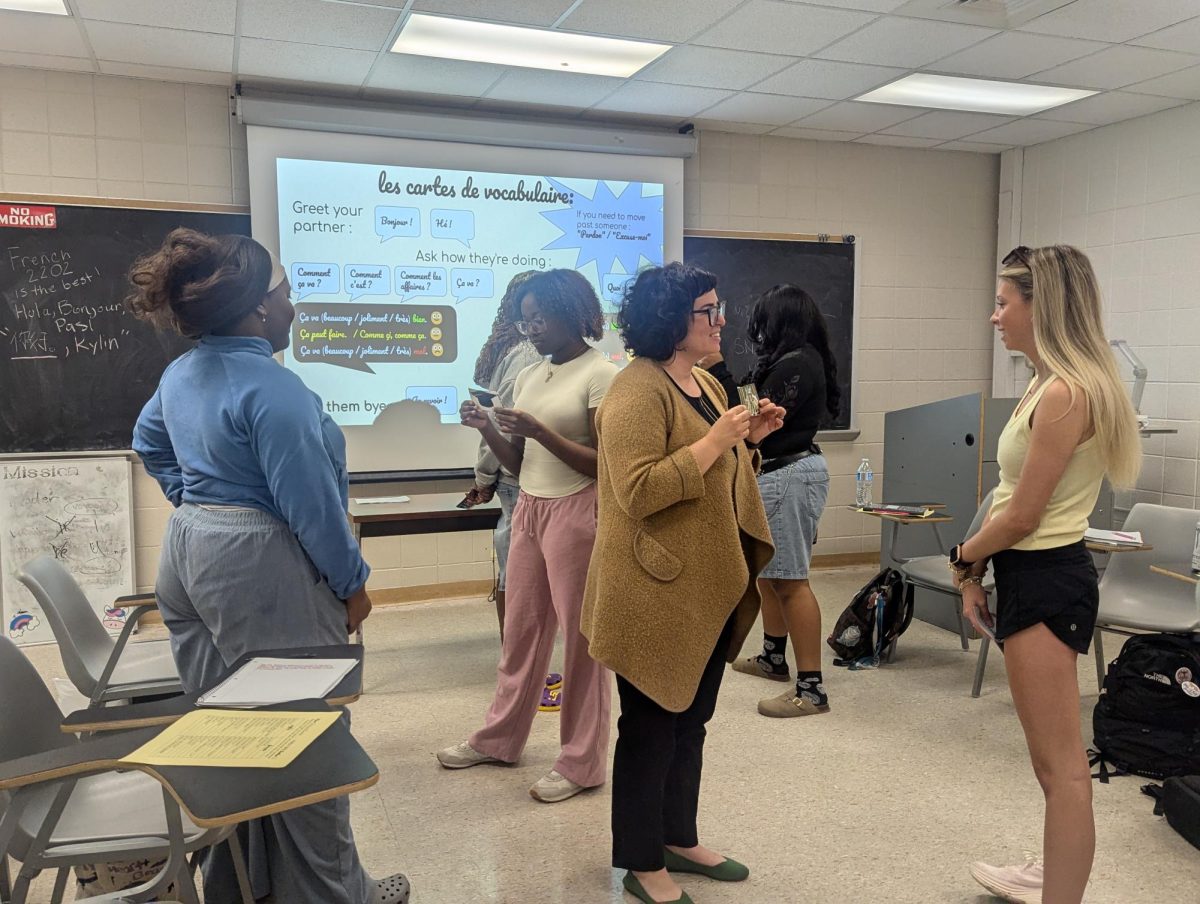For over 10 years, part of Ginger Guttner’s job description has included impersonating a tiger on social media.
The tiger goes by Mike VII; he’s LSU’s living mascot.
Guttner is Mike’s spokesperson in addition to serving as the communications manager of LSU’s School of Veterinary Medicine and an adjunct instructor with the Manship School of Mass Communication. She’s been with the Vet School for nearly 20 years and with Manship for over four.
She’s responsible for creating daily posts viewed by Mike’s 322,000 followers spread across Facebook, Twitter and Instagram. On those platforms, she speaks as him in the first-person.
But she didn’t always speak as if she was Mike. She said she took a third-person, educational approach to managing his social media accounts at first.
“I cannot stress this enough, I did a terrible job for nine months. It was not fun,” Guttner said. “I didn’t really know what to do with it, representing the veterinary school on social media.”
She said at the time she felt it was unethical to act like Mike, posting silly things that could tarnish the prestige of things like the Vet School’s hospital and research which she said improves the lives of both people and animals. Public relations professionals have a code of ethics to uphold, after all.
The first account was his Facebook, Guttner said, which the university seized around 2010 from someone trying to pose as the official Mike VI.
“It doesn’t seem that long ago, but in social media years, it may as well be 100,” Guttner said.
She said the university thought if it held an official Mike the Tiger account, it wouldn’t have to constantly police the pretenders. Because Mike’s care falls under the jurisdiction of the Vet School, managing the accounts fell to Guttner. Twitter and Instagram accounts were created not long after.
Early on, she posted around once or twice a week and said creating content was tricky. It’s interesting to watch the apex predator in person, she said, but he doesn’t really do that much throughout the day, mainly sleeping and swimming which creates a challenge for crafting social media posts.
The change to first-person happened when Guttner was in a rush and quickly needed content, so she posted “Do these stripes make me look fat?” The post was a smash and began the change she’d stick to when running Mike the Tiger’s accounts.
“I became comfortable with him being not for some grand purpose,” Guttner said. “It became easier and it’s amazing to me, the stuff that goes viral.”
Her approach was altered again whenever Mike VI was diagnosed with cancer. Nearly overnight, she said, the tiger’s number of followers doubled.
Guttner started posting more frequently so fans knew he was OK and she used third-person language, dropping any silliness anytime his health or the disease was brought up.
Mike VI was humanely euthanized on October 11, 2016. Flowers, notes and plushies piled at his habitat.
Mike VII arrived in a freshly renovated habitat on the first day of classes the next year and Guttner resumed posting to social media.
She took to posting every day to his social media accounts during the COVID-19 lockdown, again so the public knew the tiger was healthy. The same strand of the virus that could infect humans was also dangerous to tigers, she said.
“He was something you could get out of the house and go see, especially for those people trapped with small children in the house,” Guttner said. “We wanted people to know that even though the campus was officially closed, he was not closed.”
She continues posting every day of the year, mainly because the public has come to expect it and wants to know whenever he’s active.
To create a post, Guttner said, the help of the two veterinarian student-caretakers is crucial; they supply her with all of the photo and video content she posts. Erin Guillory, one of the caretakers and a veterinary medicine graduate student, said they send Guttner content via a group text message every day of the year because Mike’s accounts post every day of the year.
From there, Guttner comes up with a caption and broadcasts the post then and there. She said she never schedules posts in advance.
Guillory said sending Guttner photos and videos falls outside of her job description as a caretaker. She said she didn’t mind, adding that the “meat art” the LSU community has grown to expect also isn’t something that’s in their job description but something her and the other caretaker take passion in creating.
Guttner said Mike’s voice on his social media accounts is really her own. She said she tries to make it relatively convincing and takes special effort to ensure that “he sounds like a boy tiger.”
Guillory confirmed this. She, who’s worked with Mike every day for nearly two years, described Mike as dramatic, goofy, a little sarcastic and much smarter than he’s often credited. (Mike can recognize the cars of both caretakers and one of their fiancés, for example.)
She described Guttner as someone who was sarcastic, always with a harmless joke, quick-witted and warm.
As Mike’s spokesperson, Guttner’s duties include collecting and sometimes responding to Mike’s mail (his habitat, it turns out, doesn’t have an address so certain items are sent directly to her office), interacting with news organizations from Tiger TV to ESPN as his press secretary and attending various types of conferences to talk about him.
Over her 10 years as spokesperson, she’s hardly had any problems with internet trolls or critics. She said she’s only had to block around five people on Facebook, for example. She said organizations like People for the Ethical Treatment of Animals don’t usually target Mike the Tiger when they protest on LSU’s campus. Mike’s internet following is relatively infomed, she said, and sticks up for him on the rare occasion someone throws him shade.
Occasionally she has to redirect a fan seeking the suited mascot, who’s entirely separate from the live tiger.
“Is Mike outside?” is far and away Guttner’s most frequently asked question, followed by “How much does he weigh and how old is he?”, “Why doesn’t he have a girlfriend?” and “Why doesn’t he go to football games?”
She’s created a list of the 10 most asked questions and their answers for the media out of convenience but knows most answers by memory. Mike VII is six years old, weighs around 420 pounds and the tradition of bringing tigers into the stadium goes against the university’s mission to act as a habitat and home.
He’s usually prowling his habitat no later than 8 a.m. and will usually stay out until sunset, Guttner said. The exception is Thursday because that’s when the habitat’s yard work is done. On Thursdays, Mike usually stays inside until anywhere from 10 a.m. to 1 p.m. She didn’t clarify anything regarding a girlfriend.
Guttner is an LSU graduate. She earned a bachelor’s in English and later earned a master’s in mass communication after trying law school for a year “back when you could smoke in the building during testing, but you had to bring your own ashtray.”
She was originally from Fort Novosel, Alabama and grew up in various towns across Texas. Now 52, she said she’s basically from Baton Rouge having lived in the city since 1987.
Guttner made a point that she was a “lowly, lowly instructor” of visual communication, not a professor, at Manship. She tells her students to merely call her Ginger, or Ms. Ginger if the disparity in age is discomforting. She said that students interested in any aspect of her communications-based job need only ask and she’ll talk about what that entails.
Guttner has multiple awards in public relations and has given a TEDx talk about being Mike’s voice.
She can tell when the university chooses to use photos of Mike for promotional material versus a generic picture of a tiger.
And Mike recognizes Guttner when she visits his enclosure. He approaches the fence and rubs his side against it as if to wave. After that, Guttner said, he usually resumes to doing his own, tiger things.










